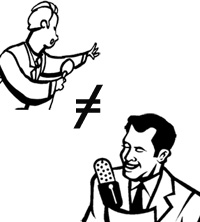Not everyone is clear about these terms and their differences, there is much confusion. “On information and communications the etymology of the word communication means participation. Communication is not simple information or the transmission of messages, it is a dialogue.
Communication must precise, in an adequate horizontal dialogue, especially saying it in the simplest way, in two directions. It is not vertical from transmitter to receiver.
Those who consider the radio is a fleeting media and that will not receive responses to their messages are wrong because with the development of communication technologies and the social researches we can obtain not only the information but also the criteria of the audience.
There is not just confusion between journalists and communicators; there is confusion between information and communication, access and participation, freedom of information and communication rights, communications in the plural and singular communication, information and knowledge, and others, but these seem to me the main ones.
According to the Spanish academician, Mariano Cebrián Herreros, communicators working with the processes, while journalists with messages. Communicators have a long-term strategic thinking, while the journalists are working on the immediacy, the news, in the latter, the urgent piece of news. Communicators provide inclusive social processes, they do not elaborate on the messages, and they talk with the people to know their needs on information and what the audience wants to be communicated.
Journalists must respect some procedures. Each media has established its own regulations and editorial approaches to the potential audiences, journalism professionals are subjected to their media rules.
According to several specialists in Latin America, a career in journalism changed its name and began calling it a career of social communication, but basically they changed their name and nothing else, it remains a career in journalism, where they study radio, film and television characteristics, including public relations and company-customer communication, but basically it is the same thing.
People usually mixed the terms communicator and announcer, two careers with different course listings and defined functions, although one could pursue the academic rigors for announcing where the professional training is superior.
The work of the communicator is linked to some processes; it should be clear that participation and access to participate are not the same. Frequently, we heard that the audience participates, in fact the audience accesses. Accessing is listening to the radio; sending a letter to a program and responding in writing to a contest.
However, participation is different. Participation is involvement in the process of appropriation, the communicative process itself. Obviously in the mass media it is almost impossible, which explains the immediacy of the alternative media for over 40 years. There are thousands of community and independent radio stations around the world, particularly in Latin America, and that is explained by the difficulty of entering and transforming from within the large commercial media.
The great paradox between the speaker and the communicator stems from the first not reaching a cultural level that allows fluency, purpose and empathy with the audience. The radio communicator is linked to long-term projects and they are also nurtured by journalism professionals.
It is not uncommon for a journalist or actor to announce a political activity or an award ceremony of a great relevance, as well as a journalist announcing radio news or a news program.
What would be the problem? What is the need to replace one professional with an other? There may be many reasons but in most cases it relies on the facility of improvisation or knowledge of the issue. All this may be the case and what to do to solve it.
It is very important to reclassify, to train with the communication requirements. The use of deep voices does not seem the solution of these times, an essential requirement in other times.
The communicator must be a media professional to these audiences that have a different dynamic, with a wealth of knowledge and a cultured listener. The space is reduced to insignificance; it also introduces new elements linked to real issues of the audience, as part of the interactive communication model.
We talk about the fourth estate that is attributable to the media, but, the Director of Le Monde Diplomatique, Ignacio Ramonet, “it is now necessary to create a fifth estate, which would allow a civic citizen’s force to oppose the new ruling coalition, a fifth estate, whose function would be to denounce the power of the international mass media, the great media groups and the broadcasters and accomplices of general globalization.”
Let’s remember that the mass media belong to powerful groups. When that great power is attributed to the media, behind it is hidden the economic and political power which decides what is published or not. Knowing that is to know more precisely the role of those who design and support all the campaigns.
The effort focuses on the training of speech professionals more closely, to include and not segment the challenge of speaking professionals on the radio, the medium that concerns us and to which this effort and creative thinking is dedicated. Hopefully for the results, which radio needs.


